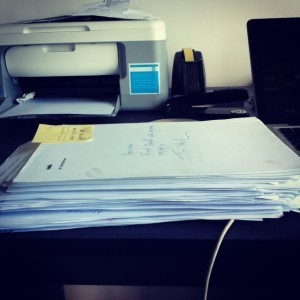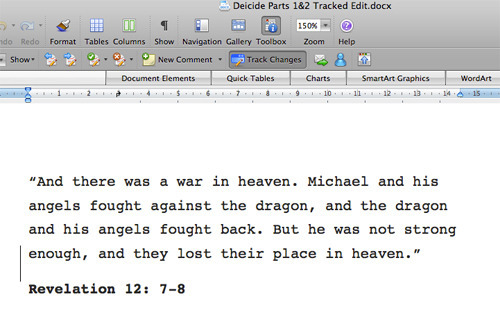5 Simple Editing Tips
5 Simple Editing Tips
To paraphrase the late great David Rakoff, editing is like pulling teeth. From your dick.
After letting the creative juices flow out of you like hot blood from a stab wound, it can be soul destroying to tear your word-baby apart limb by limb. But, it’s worth it. Even if you’re a professional and have someone to help, editing your own work is a must. In the electronic age of ‘write, click, post’, you look even more professional if what you put out in the world is polished.
When I started writing, I was TERRIBLE at editing. My mind goes faster than my fingers or eyes, so I ended up skimming and missing obvious mistakes. I’m still far from perfect; anyone who has received an email from me will know this. But, I’ve found that a few simple tricks can help a lot for those who are unsure where to start.
1. Change Fonts.
I tend to write and publish in either Cambria or Arial, because they look nicer. However, I always edit in Courier. Why? It’s a font that gives the same amount of space to each character, so you’re less likely to miss things, which are otherwise squashed together.
2. Change Formatting
There’s a reason most publishing houses ask you to at least have 1.5 spacing when submitting. It’s easier for them to spot mistakes too. To spread things out even further, double space your work and either set a larger font size or increase the view % in your word doc. Bigger is better. Space and size mean mistakes are easier to spot. Thanks to computer technology it’s easy to flip things around for a fresh view.
3. Leave Some Time Between Writing and Editing
Some people say read things backwards to take the writing out of context. I kind of think that’s silly. Spellcheck will weed out genuine spelling errors of ‘non-words’. However things like except/expect, solider/soldier, they’re/their/there, and so on, won’t be picked up by regular software. They need to be read in context of what you’re hoping to articulate. If something isn’t time sensitive, leave it for at least a couple of weeks before reading again. You’ll forget exactly what you were saying and ‘fresh eyes’ will better spot mistakes and clumsy sentences.
4. Read It Out Loud.
A lot of editors and even school teachers will tell you this one. Do it. Most people don’t, no matter how often they’ve been told, because they think they look silly. Who cares? Lock yourself in your bedroom if you have to, or better yet, read it to someone you’re comfortable around. You’ll be amazed at the amount of things that sound odd when put into spoken word. It will also help you better place punctuation with natural pauses in speaking.
5. Pay someone else to do it.
Remember the old saying, “If you want something done properly you have to do it yourself?” I realised that was bullshit when watching my Dad ‘fix’ our lawnmower every second weekend as a child. Hire someone who knows what they’re doing. It will save time and heartache in the long term for the projects you care about most. There are lots of great professional services out there who are well-priced. Just don’t get sucked in to going ultra cheap and let quality suffer because of it. Always seek recommendations from Writer’s Centres in your closest capital city for the best options.
If you think this fifth tip is cheating, or don’t want to fork out the cash, an alternative tip is: repeat steps 1-4. Read it again and again. And again.









